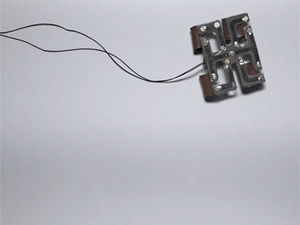



Date:23/05/18
 Many natural organisms have the ability to repair themselves. Now, manufactured machines will be able to mimic this property. In findings published this week in Nature Materials, researchers at Carnegie Mellon University have created a self-healing material that spontaneously repairs itself under extreme mechanical damage.
Many natural organisms have the ability to repair themselves. Now, manufactured machines will be able to mimic this property. In findings published this week in Nature Materials, researchers at Carnegie Mellon University have created a self-healing material that spontaneously repairs itself under extreme mechanical damage.
This soft-matter composite material is composed of liquid metal droplets suspended in a soft elastomer. When damaged, the droplets rupture to form new connections with neighboring droplets and reroute electrical signals without interruption. Circuits produced with conductive traces of this material remain fully and continuously operational when severed, punctured, or had material removed.
Applications for its use include bio-inspired robotics, human-machine interaction, and wearable computing. Because the material also exhibits high electrical conductivity that does not change when stretched, it is ideal for use in power and data transmission.
"Other research in soft electronics has resulted in materials that are elastic and deformable, but still vulnerable to the mechanical damage that causes electrical failure," said Carmel Majidi, an associate professor of mechanical engineering. "The unprecedented level of functionality of our self-healing material can enable soft-matter electronics and machines to exhibit the extraordinary resilience of soft biological tissue and organisms."
Majidi, who directs the Integrated Soft Materials Laboratory, is a pioneer in developing new classes of materials in the field of soft matter engineering.
"If we want to build machines that are more compatible with the human body and the natural environment, we have to start with new types of materials," he said.
Majidi holds a courtesy appointment in the Robotics Institute. Other authors include Eric Markvicka and Xiaonan Huang of Carnegie Mellon University, and Michael D. Bartlett of Iowa State University.
Self-healing material a breakthrough for bio-inspired robotics
 Many natural organisms have the ability to repair themselves. Now, manufactured machines will be able to mimic this property. In findings published this week in Nature Materials, researchers at Carnegie Mellon University have created a self-healing material that spontaneously repairs itself under extreme mechanical damage.
Many natural organisms have the ability to repair themselves. Now, manufactured machines will be able to mimic this property. In findings published this week in Nature Materials, researchers at Carnegie Mellon University have created a self-healing material that spontaneously repairs itself under extreme mechanical damage.This soft-matter composite material is composed of liquid metal droplets suspended in a soft elastomer. When damaged, the droplets rupture to form new connections with neighboring droplets and reroute electrical signals without interruption. Circuits produced with conductive traces of this material remain fully and continuously operational when severed, punctured, or had material removed.
Applications for its use include bio-inspired robotics, human-machine interaction, and wearable computing. Because the material also exhibits high electrical conductivity that does not change when stretched, it is ideal for use in power and data transmission.
"Other research in soft electronics has resulted in materials that are elastic and deformable, but still vulnerable to the mechanical damage that causes electrical failure," said Carmel Majidi, an associate professor of mechanical engineering. "The unprecedented level of functionality of our self-healing material can enable soft-matter electronics and machines to exhibit the extraordinary resilience of soft biological tissue and organisms."
Majidi, who directs the Integrated Soft Materials Laboratory, is a pioneer in developing new classes of materials in the field of soft matter engineering.
"If we want to build machines that are more compatible with the human body and the natural environment, we have to start with new types of materials," he said.
Majidi holds a courtesy appointment in the Robotics Institute. Other authors include Eric Markvicka and Xiaonan Huang of Carnegie Mellon University, and Michael D. Bartlett of Iowa State University.
Views: 409
©ictnews.az. All rights reserved.Similar news
- Azerbaijani project to monitor disease via mobile phones
- Innovative educational system to be improved under presidential decree
- NTRC prolongs license of two TV and radio organizations for 6 years
- Azerbaijan establishes e-registry for medicines
- Azerbaijani museum introduces e-guide
- Nar Mobile opens “Nar Dunyasi” sales and service center in Siyazan city
- International conference on custom electronic services held in Baku
- OIC secretary general to attend COMSTECH meeting in Baku
- Azerbaijan develops earthquake warning system
- New law to regulate transition to digital broadcasting in Azerbaijan
- Azerbaijani State Social Protection Fund introduces electronic digital signature
- Intellectual traffic management system in Baku to be commissioned in December
- Tax Ministry of Azerbaijan started receiving video-addresses
- World Bank recommends Azerbaijan to speed up e-service introduction in real estate
- Azerbaijan to shift to electronic registration of real estate





















